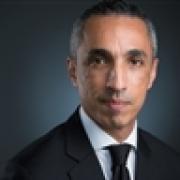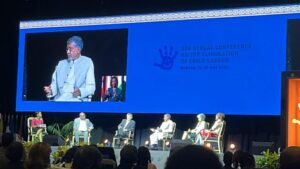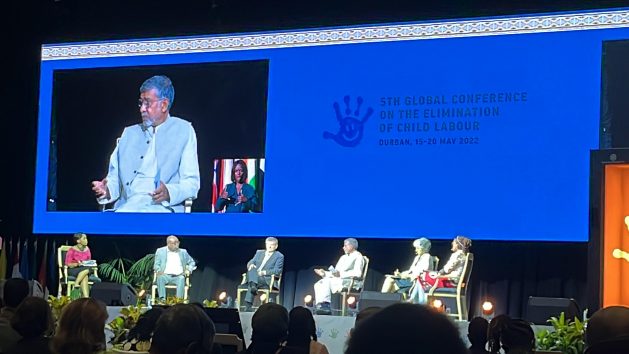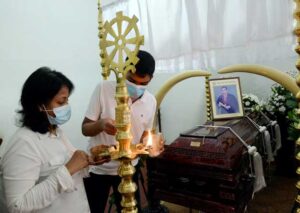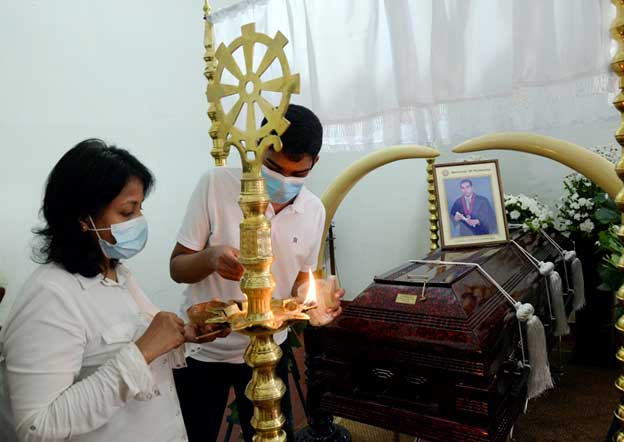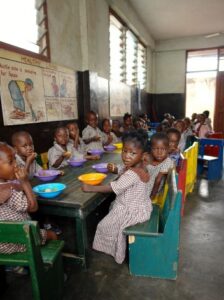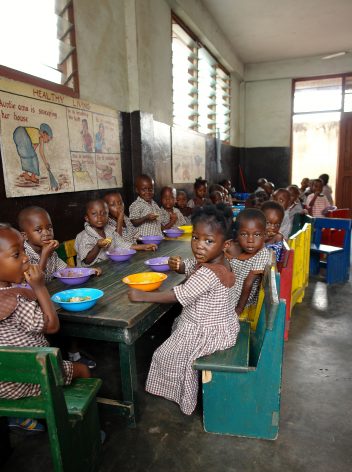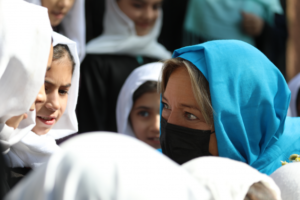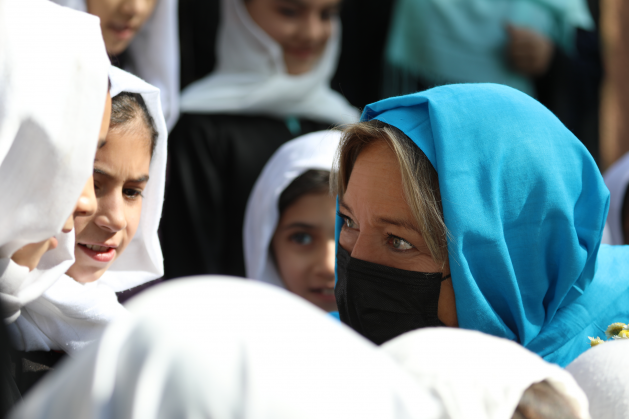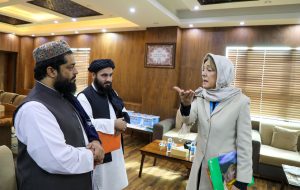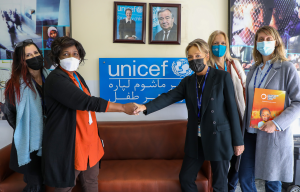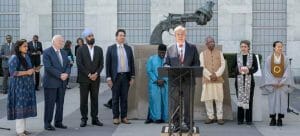

An Interfaith Moment of Prayer for Peace at UN Headquarters. Credit: UN Photo/Eskinder Debebe
UN Secretary-General António Guterres said the gathering was taking place at a unique moment: on the last Friday of Ramadan, as Christians celebrate Easter, Jews mark the end of Passover, and Sikhs enjoy the festival of Vaisakhi. “Even the calendar is sending a message of unity,” he remarked. “Today, at this blessed moment of renewal across faiths, let us lift our hearts and voices for peace – our guiding star and our most precious goal.” April 2023
By Azza Karam
NEW YORK, Jun 28 2023 (IPS)
For the last 30 odd years, I have maintained that religions matter. I noted the reasons for why they matter, and always listed how they matter —as social service providers, as first responders in humanitarian crisis; as mediators in tensions and conflicts, as upholders of common good and the values of humanity; as protectors of children and of the most vulnerable; and even as political actors.
All to name but a few. I still feel amused when some of those I trained among the UN staff and the faith-based NGO community, quote something I said, in public – albeit without even being aware they are quoting (I am trying to be kind here) – such as: “we should not be talking about whether religions matter, but how they matter”.
In 2007, while at UNDP, I was told, more than once, “we do not do religion”. By the time I left the UN in 2020, after building two bodies – an Interagency Task Force on Religion and its Multi Faith Advisory Council – it was clear that almost all UN entities were competing to ‘do religion’. In fact, some UN entities are competing for religious funding.
While I have not lost that faith in faith itself, over the last years, I have grown increasingly incredulous of those who would speak in the name of ‘religion’. It is hard not to feel distinctly bemused, when versions of ‘if religious actors/leaders are not at the [policy] table, they will be on the menu]’, are being told in one gathering after another.
Often by the same kinds of speakers, among the same kinds of audiences, albeit meeting more and more frequently – and often more lavishly — in different cities around the world.
The reason for bemusement, is not disillusion with the unparalleled roles that various religious institutions and communities of faith play. Far from it. These roles are, in short, vast. In fact, they are as impossible to quantify, as they are implausible to assume full comprehension of.
After all, how do you accurately measure the pulse of our individual spiritualities – let alone our collective sense thereof? Religious leaders, religious institutions, faith-based and faith-inspired NGOs (FBOs) – let alone faith communities – are massive in number, and permeate all the world’s edifices, peoples and even languages. Faiths, and expressions of religiosity, are likely as numerous as the hairs on an average head (not counting those who may be lacking vigour in that department).
No, the reason for bemusement is disillusionment with the trend of commercialisation of religion, the business of ‘doing religion’. The emerging marketplace of “religion and [fill in the blanks – and anything is possible]” is reminiscent of not too many decades ago, when so many academics, consultants, think tanks, NGOs, worked on the business of democracy and/or good governance and/or human rights. Then, as now, projects, programmes, initiatives, meetings, and more meetings, were hosted.
A global emerging elite of ‘experts’ in the above (or variations thereof) permeated the four and five-star hotel meeting rooms, gave business to caterers and conference centres as they traipsed the ‘conference circuits’ from north to south, populated proposals to governments, philanthropists and various donor entities.
They defined the missions of for-profit consultancies claiming to enable the strategic capabilities, to inform the media presences, to refine the narratives, to provide the leadership coaching, to jointly express the common values, to uphold the good in public service… And so on.
We are not living in better democracies now, in spite of all that business. Will we have more faithful societies? Will people pray more, for one another and serve more selflessly now that ‘religion’ is in? Somehow, I doubt it.
By the time we realised the extent of the commercialisation of democracy and human rights, the commercial nature had corrupted much of the sagacity – and the necessary courage – there was. Even autocrats bought into the business of doing democracy and human rights, and used the narratives to enhance their respective agendas.
Few democratic actors worked together, and even fewer collaborated to serve – and save – the whole of humanity. As with any business venture, the motive of profit – and power – of some, dominated.
And rather than a consolidated civil society effort holding decision makers accountable for the sake of the most vulnerable, and collectively and successfully eliminating the tools of harm, we are living in the era where money, weapons – including nuclear ones – control over resources, and war (including war on this earth), dominate.
Today, some of the most authoritarian and self-serving regimes, and some of the most power-seeking individuals, and their retinues, are vested in the business of ‘religion’. And why not? It is among the most lucrative domains of financial, political and social influence.
Decades of study, however, point to some simple questions to ask, to distinguish the transactional nature of ‘religious affairs’ claiming to be for the good of all, from those actually serving the common good.
The questions include the following:
How many of those engaged in the work of religion (whether as religious or secular actors) actually give of or share, their varied resources, to/with one another (including those from other/different religions, entities, age groups, countries, races, etc.)?
How many different religious organisations plan and deliver, jointly, the same set of services to the same set of needs, in the same neighborhoods or in the same countries?
How many ‘religious actors’ actually partner with ‘secular’ civil society organisations to hold institutions of political and financial power equally accountable – if need be, at cost to their own welfare. In other words, how many stand on principle, irrespective of the cost?
And, my personal favourite: what are these religious actors’ respective positions on women’s rights, on gender equality and/or on women’s leadership?
The more diplomatic way to frame that is also one of the most powerful litmus tests: which human rights do these actors working on/with/for religion, value more? You see, those who are engaged in transactional practices wearing a religious garb, will invariably prioritise some rights, or some privileges, over others.
The answer to this question therefore, will indicate the difference between a coalition of religious fundamentalists (including secular power seekers and some religious and political leaders), and a multilateral alliance dedicated to serving the common good – for each and all, barring none, especially in the most challenging of times.
Azza Karam is a Professor of Religion and Development at the Vrij Universiteit of Amsterdam and served as a member of the UN Secretary General’s High Level Advisory Board on Effective Multilateralism.
IPS UN Bureau



